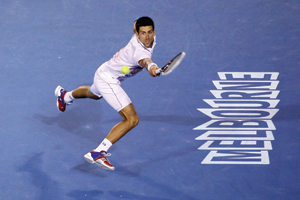The ATP’s landmark deal with Tennis Australia to dramatically increase prize money by 2016 for the Australian Open could place significant pressure on the other three Grand Slams, especially the U.S. Open, to change their approach to the financial standoff with the sport’s male players.
 |
By 2016, the Australian Open will be paying about $41 million in prize money.
GETTY IMAGES
|
That at least is the hope within men’s tennis, according to several sources. “The ATP is trying to make a seismic change in the way the Slams pay the players,” said one source.
The ATP, under new CEO Brad Drewett, has spent most of the year asking for a major increase in compensation that would start to reflect the percentage of revenue paid to athletes seen in other sports — which in U.S. team sports can be more than 40 percent — and at the ATP’s own events. Drewett, a former player and who is Australian, declined comment.
Last month, reports emerged that players would consider attending an alternate event to the Australian Open because of the issue, a not-so-subtle boycott threat. Tennis sources said there were, in fact, discussions with other cities, many in the Middle East and Asia, about staging an unofficial Slam. Now, under the recently announced deal in Australia, the Australian Open by 2016 will be paying about $41 million in prize money, which a key source said is about 24 percent of revenue, a sharp rise from the mid-teens percentage level of just a few years ago.
The Australian Open had already been paying more as a percentage than the other three Slams, so now the bar is ever higher.
At the U.S. Open, which internal ATP figures show as having $250 million in revenue, its $25 million prize money payout right now is 10 percent (half to men and half to women), the lowest among the four Slams. An Open with no revenue growth by 2016 would have to increase prize money 140 percent over the next four years, or $8.75 million a year, to reach that 24 percent threshold. Of course, revenue is likely to grow, so the gains in prize money would have to go up even further to meet that percentage then.
The U.S. Tennis Association, which owns the Open, declined to comment. In the past, the USTA has strenuously opposed sharp increases, arguing that doing so would de-fund grassroots program and perhaps even the plans to renovate the National Tennis Center.
The next critical moment appears to be the players’ meeting next week at the ATP’s Paris tournament. That is where they should learn more about the other three Slams’ responses, said ATP Player Council member Sergiy Stakhovsky, writing on Twitter last week when contacted by SportsBusiness Journal.
Stakhovsky has been outspoken on the matter and has particularly been vocal about WTA players appearing to get a free ride. The four Slams are committed to equal prize money, so whatever increase the men receive, so do the women. The WTA, in a statement, said, “Tennis Australia has shown great leadership with their significant, long-term commitment to increased fair and equal prize money compensation for the athletes of our sport.”
Representatives for Wimbledon and the French Open did not reply to queries seeking comment.




